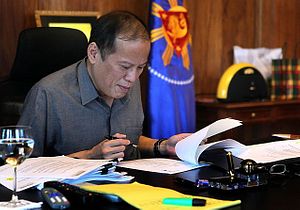If 2014 was the year when the Philippines struggled to recover from the devastating impact of Typhoon Haiyan (Yolanda), what might await Philippine politics in 2015?
1. The state visit and apostolic journey of Pope Francis was a much needed spiritual boost for many people in the Philippines, the largest Catholic-dominated nation in Asia. He visited Typhoon Haiyan victims, interacted with the youth and street children, and spoke about “scandalous” poverty and corruption in front of the country’s top leaders. Will politicians heed the pope’s reminder to “reject every form of corruption that diverts resources from the poor”? The pope spent only five days in the Philippines but he has already made a huge impact on local politics.
2. Once Pope Francis leaves the Philippines, it will signal the unofficial start of campaigning for the 2016 presidential election. There will be intense bickering among politicians in the next few months. The ruling coalition is expected to consolidate its ranks and election machinery while aggressively marginalizing the political opposition. But while President Benigno Aquino III continues to be popular, he is constitutionally barred from running again and his allies are trailing behind opposition leader and Vice President Jejomar Binay in pre-election surveys.
3. The dispute with China over the conflicting territorial and maritime claims in the West Philippine Sea (South China Sea) is still the main agenda that the Philippines will continue to raise in the Asia-Pacific region. The Philippines has filed a case in the United Nations Arbitral Tribunal against the ownership claims of China. This will further inspire Filipinos to mobilize against what they see as China’s bully behavior in the region.
4. The next six months is crucial to implement the roadmap for peace which the government has drafted in cooperation with the leaders of the Moro Islamic Liberation Front. The initial challenge is to pass the Bangsamoro Basic Law in Congress without it being diluted; and to convince legal scholars and critics that it does not violate the 1987 Constitution. If Aquino succeeds in establishing the Bangsamoro transition authority before the end of his term next year, it will be a major legacy of his administration.
Another initiative that Aquino can pursue is the resumption of the stalled peace talks with communist rebels.
5. The economic experience of the Philippines will be under global scrutiny as it prepares to host the annual summit of the Asia Pacific Economic Cooperation (APEC). Aquino earlier announced that the theme of this year’s APEC gathering is “Building Inclusive Economies, Building a Better World”.
“As the clamor for progress that leaves no one behind resounds the world over, the Philippines has the opportunity to set a global example of inclusivity this year,” Aquino said. But while he is proud of the country’s strong economic fundamentals, critics will probably remind APEC participants about the failure of the economy under Aquino to solve poverty and deep inequality in society.
The last time Manila hosted the APEC summit was in 1996.
The planned economic integration of the Association of Southeast Asian Nations (ASEAN 2015) will be another major event, but whether or not it will figure prominently in the country’s politics remains to be seen.
6. Disaster recovery will be a priority for both the national and local governments. Aquino cannot allow the slow pace of rehabilitation in the Haiyan-affected towns to continue if he wants to get a better assessment of his administration. His leadership will be defined by the success or failure of his disaster recovery program in Samar and Leyte. As for local politicians in other disaster-hit towns, they risk losing public support if they appear ineffective in distributing relief and making aid money useful in reviving the local economy.
These 12 months are a period of preparation for the Philippines’ big year in 2016, when the country is due to vote in a new president. It is a year in which the current government will seek to take bold steps to leave a positive and lasting legacy while the opposition tries to present itself as a credible alternative. Because of this, 2015 promises to be an exciting year for Philippine politics.

































